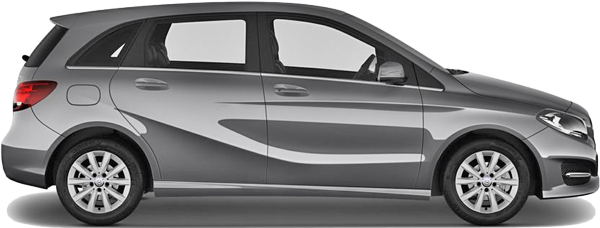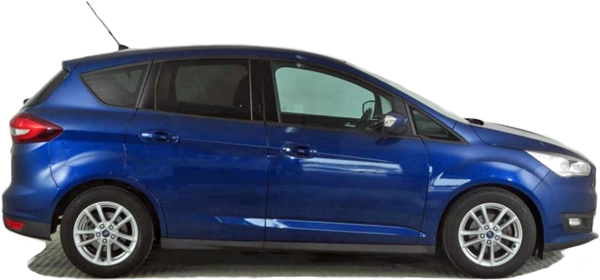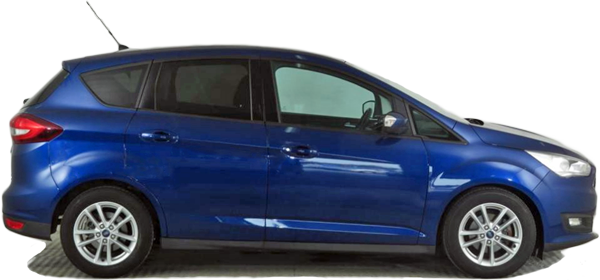The Comparative Analysis :
Mercedes B 250 e (15 - 17) vs. Ford C-MAX 2.0 TDCi Powershift (15 - 18)
€ 40,300

€ 29,000

€ 40,300
Base Price ⓘBase price of a new vehicle with standard equipment in Germany at market launch.
€ 29,000
ⓘBase price of a new vehicle with standard equipment in Germany at market launch. Price Info
Vehicle Dimensions
The dimensions of these vehicles differ slightly. The Mercedes B 250 e is 1.3 cm longer, 4.2 cm narrower and 5.3 cm lower than the Ford C-MAX 2.0 TDCi Start/Stopp.
Mercedes B 250 e
Ford C-MAX 2.0 TDCi Start/Stopp
1557
1786
2010
1610
1828
2067
1786 mm
Width
1828 mm
2010 mm
Width Incl. Mirrors
2067 mm
1557 mm
Height
1610 mm
2699
4393
2648
4380
4393 mm
Length
4380 mm
2699 mm
Wheelbase
2648 mm
Vehicle Weight
Mercedes B 250 e
Ford C-MAX 2.0 TDCi Start/Stopp
1725 kg
Kerb Weight
1519 kg
2170 kg
Gross Vehicle
Weight
Weight
2050 kg

Weight Difference:
206 kg
11.94 %

General
Mercedes B 250 e
Ford C-MAX 2.0 TDCi Start/Stopp
W242
Generation
DXA
Multi-Purpose Vehicle
Car Body Style
Multi-Purpose Vehicle
Electricity
Fuel Type
Diesel

Front-wheel drive
Drive
Front-wheel drive

1-speed automatic transmission
Transmission
6-speed dual clutch transmission
Engine
Mercedes B 250 e
Ford C-MAX 2.0 TDCi Start/Stopp
Permanent magnet synchronous motor
Engine Type
Straight-four diesel engine with turbocharger
0
Valves
4
0
Cylinders
4
0 CC
Engine Capacity
1997 CC
178 bhp
at 9900 rpm
Power
168 bhp
at 3500 rpm
Mercedes B 250 e
178 bhp
168 bhp
Ford C-MAX 2.0 TDCi Start/Stopp
340 NM
at 0 rpm
Max. Torque
400 NM
at 2000 rpm
Mercedes B 250 e
340 NM
400 NM
Ford C-MAX 2.0 TDCi Start/Stopp
Performance
Mercedes B 250 e
Ford C-MAX 2.0 TDCi Start/Stopp
99 mph
Maximum Speed
132 mph
7.9 sec
Acceleration 0 to 62 mph
8.5 sec
62 mph
62
mph
mph
110 m
0.000 sec

Mercedes B 250 e
62 mph
62
mph
mph
118 m
0.000 sec

Ford C-MAX 2.0 TDCi Start/Stopp
▶ REPLAY
9.69 kg/bhp
Weight-to-Power Ratio
9.04 kg/bhp
Mercedes B 250 e
9.69 kg/bhp
9.04 kg/bhp
Ford C-MAX 2.0 TDCi Start/Stopp
Fuel Economy / Emissions
Mercedes B 250 e
Ford C-MAX 2.0 TDCi Start/Stopp
Fuel Economy
27 kWh✽
( 150 MPGe ⓘ Miles per gallon petrol equivalent (MPGe) is a measure of the average distance traveled per unit of energy consumed. MPGe, specified in miles per imperial gallon (~4.546 litres), is used to compare the energy consumption of vehicles that use different energy sources.)
combined ✽ per 100 miles
59 mpg
( 66 MPGe ⓘ Miles per gallon petrol equivalent (MPGe) is a measure of the average distance traveled per unit of energy consumed. MPGe, specified in miles per imperial gallon (~4.546 litres), is used to compare the energy consumption of vehicles that use different energy sources.)
Mercedes B 250 e
150 MPGe
66 MPGe
Ford C-MAX 2.0 TDCi Start/Stopp
No data
city
51 mpg
No data
motorway
64 mpg
28 kWh
Fuel Tank Capacity
60 L
105 mi
Range
777 mi
Mercedes B 250 e
105 mi
777 mi
Ford C-MAX 2.0 TDCi Start/Stopp
Environmental Impact
53.9 kWh
Total Energy Consumption
per 100 miles ⓘThe total energy consumption per 100 miles is the amount of energy consumed by a vehicle when burning fuel or using electricity per 100 miles (final energy), and the energy required to produce the appropriate amount of fuel or electricity (primary energy).
per 100 miles ⓘThe total energy consumption per 100 miles is the amount of energy consumed by a vehicle when burning fuel or using electricity per 100 miles (final energy), and the energy required to produce the appropriate amount of fuel or electricity (primary energy).
98.8 kWh
Mercedes B 250 e
53.9 kWh
98.8 kWh
Ford C-MAX 2.0 TDCi Start/Stopp
Elektrofahrzeug
Emission Standard
Euro 6b (NEFZ)
0 g/km (NEFZ)
CO2 Emissions
124 g/km (NEFZ)
Practical Convenience
Mercedes B 250 e
Ford C-MAX 2.0 TDCi Start/Stopp
5
Doors
5
5
No. of Seats
5
445 kg
Maximum Payload
531 kg
501 L
Boot Capacity
471 L










1456 L
Boot Capacity (Seats Down)
1723 L
















